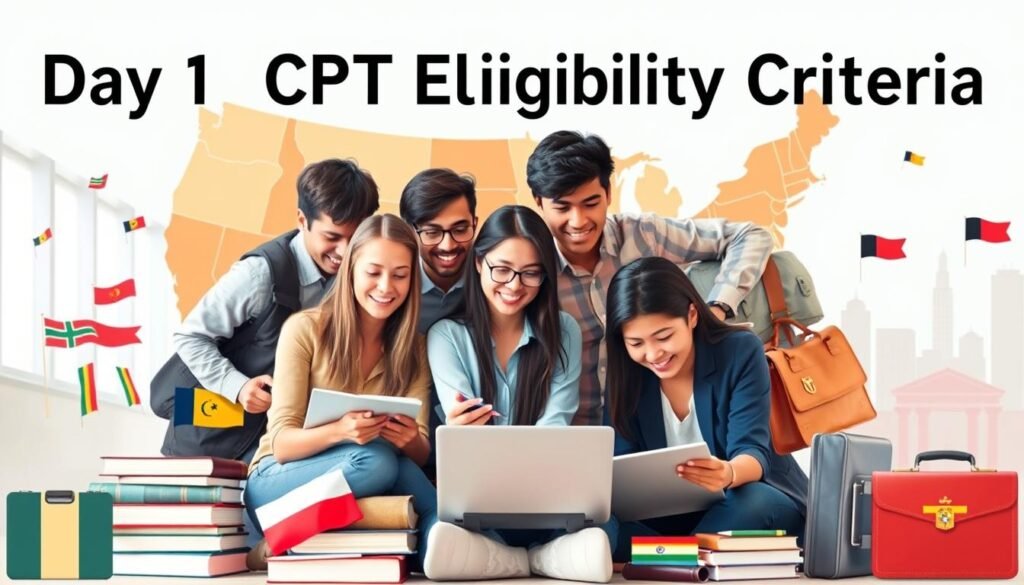As an international student in the United States, dealing with visa rules can be tough. Day 1 Curricular Practical Training (Day 1 CPT) is a popular choice. But What is Day 1 CPT, and how does it affect your visa? This article will explain What is Day 1 CPT, its benefits, and the risks you need to know.
What is Day 1 CPT – Day 1 CPT lets F-1 visa students start paid internships or work right away in their graduate program. It’s great for students in fields like hospitality, nursing, and education. These fields need real-world experience to learn.
But, using Day 1 CPT can be tricky. It might seem like a way to work more in the U.S. Using it wrong can cause big problems. You could lose your F-1 visa and even face deportation. It’s key to understand What is Day 1 CPT well to avoid these issues and keep your visa options open, like the H-1B visa or green card.
Key Takeaways
- Day 1 CPT lets international students work from the start of their program, offering valuable experience while studying.
- Using Day 1 CPT correctly can save money on tuition and living costs. It also boosts your job chances.
- Abusing Day 1 CPT can lead to serious problems, like losing your F-1 visa and deportation.
- Talking to your school’s designated school official (DSO) is vital. They help you follow rules and make smart career choices.
- Day 1 CPT might affect your chances for Optional Practical Training (OPT) or other work permits after you graduate.
Understanding Day 1 CPT: Definition and Purpose
As an international student in the United States, finding work can be tough. But, Curricular Practical Training (CPT), especially Day 1 CPT, is becoming more popular. It lets students start working in their field right away, giving them a big advantage in their career.
What Does CPT Stand For?
CPT stands for Curricular Practical Training. It’s a work permit for international students to work off-campus in their field of study. It’s meant to add to their studies, letting them use what they learn in class in real jobs.
How Day 1 CPT Differs from Traditional CPT
Day 1 CPT is different from regular CPT because it starts sooner. While regular CPT waits until after a year, Day 1 CPT lets students start right away. This means they can start learning and networking sooner.
The Purpose of Day 1 CPT for International Students
Day 1 CPT gives international students quick access to work in their field. It lets them start working right when they start school. This helps them:
- Get real-world experience and skills
- Meet professionals and maybe find jobs before they graduate
- Make money while they study, helping with living costs
But, Day 1 CPT is for learning new skills, not just to make money or work for work’s sake.
“Day 1 CPT is a game-changer for international students, allowing them to hit the ground running and gain invaluable practical experience from the very start of their academic journey.”

The Eligibility Criteria for Day 1 CPT
If you’re an international student on an F-1 visa, you might be able to start Curricular Practical Training (CPT) on your first day. This is called “Day 1 CPT.” It lets you get real-world experience in your field while you’re in school.
Who Can Apply for Day 1 CPT?
To qualify for Day 1 CPT, you need to be a full-time F-1 international student. You must be in a degree program at an accredited university or college. The school must be recognized by a major accrediting body, like the Higher Learning Commission or the Southern Association of Colleges and Schools.
Educational Institutions Offering Day 1 CPT
Day 1 CPT isn’t in the Code of Federal Regulations, but it’s allowed as an exception. Not every university or college offers this. It’s more common at private schools, and availability can differ.
Required Documentation for Application
- Maintain a good academic standing with a GPA of 3.0 or higher.
- Ensure that the proposed CPT work is closely related to your academic program and major.
- Obtain and renew your CPT I-20 form before starting any work.
- Consult with your Designated School Official (DSO) to understand the application process and submit the required documents.
Remember, using Day 1 CPT can affect your visa status and future immigration. It’s crucial to think carefully about your choices. Make sure they match your academic and career plans.

Benefits of Participating in Day 1 CPT
Being part of Day 1 Curricular Practical Training (CPT) offers many benefits for international students. It lets you start working or interning right away. This way, you can use what you learn in class in real-life situations.
Gaining Practical Experience Early
Day 1 CPT lets you start your internship or work experience right when you start school. Getting to do real tasks early can make you stand out in the job market. You’ll learn important skills and show employers what you can do.
Networking Opportunities with Industry Professionals
Day 1 CPT also means you get to meet industry experts and make important connections. These connections can lead to mentorship, insider tips, and even job offers before you graduate. Using these connections can really help your career.
Impact on Your Resume and Career Prospects
Being part of Day 1 CPT can really boost your resume and career chances. Employers like to see that you’ve applied what you learned in class. This can help you get ahead when looking for a job after you graduate.
But, it’s key to think about the downsides too, like not having time for many internships. Talking to your Designated School Official (DSO) can help you decide what’s best for your future.
“Gaining practical experience early through Day 1 CPT has been a game-changer for my career. The opportunity to apply classroom knowledge in a real-world setting and build industry connections has been invaluable.”
By taking advantage of Day 1 CPT, international students can make their resume stronger, grow their professional network, and get ready for the job market.
Potential Risks Associated with Day 1 CPT
Day 1 Curricular Practical Training (CPT) offers valuable chances for international students. But, it also has risks to think about. Knowing the visa and compliance issues is key to not messing up your studies or career.
Visa Status Implications and Compliance Issues
Day 1 CPT can affect your F-1 visa status. Using full-time CPT for over a year might cut off your Optional Practical Training (OPT) options. This could limit your work rights after graduation.
Also, you might face a Request for Evidence (RFE) from USCIS during your H-1B visa application. This could slow down or even block your work visa.
Risk of Program Misuse and Consequences
Abusing Day 1 CPT can lead to serious problems, like deportation. The University of Farmington case in 2019 showed how fake programs can cause trouble. Getting caught in a scam can lead to arrest or deportation.
How to Avoid Common Pitfalls
To avoid risks with Day 1 CPT, follow F-1 visa rules and keep records of your work. Talk to your Designated School Official (DSO) to understand your duties. Remember, Day 1 CPT is not just for work. Immigration laws can change, affecting your Day 1 CPT status.
“The misuse of Day 1 CPT can have severe consequences, including potential deportation. Enrolling in non-accredited or fraudulent programs can result in legal troubles, including arrest or deportation.”
Expert Recommendations for Day 1 CPT
Before you start Day 1 CPT, do your homework. Talk to your school’s designated school official (DSO). It’s key to understand the program and your role as an international student.
Consulting with Your Designated School Official (DSO)
Your DSO is a big help with Day 1 CPT. They know the rules and can guide you. Keeping in touch with them helps you stay on the right track.
Understanding Your Responsibilities
As a Day 1 CPT worker, you must keep a good GPA. You also need to go to all your classes and make sure your job fits your studies. Not doing this can hurt your visa and future jobs.
Making Informed Decisions About Your Career Path
Think about Day 1 CPT’s short and long-term effects. It gives you work experience and money now. But, it might affect your chances for other work visas later. Look at other job options like on-campus jobs or university internships. Knowing about visa rules and talking to immigration experts is smart.